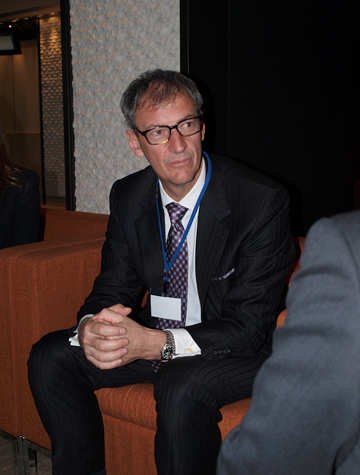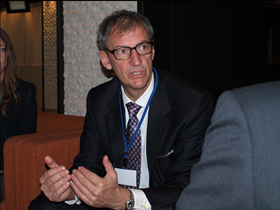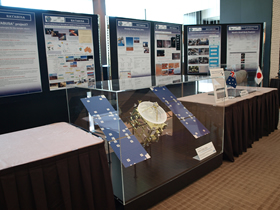Interview with Dr. Michael Green, DIISR, Australia
November 2010, at APRSAF-17, Melbourne

The APRSAF Secretariat conducted an interview with Dr. Michael Green, General Manager, Innovation and Space Branch, Manufacturing Division, Department of Innovation, Industry, Science and Research (DIISR) of Australia on the occasion of APRSAF-17, in late November 2010, in Melbourne, Australia. DIISR was one of the co-host organizations of APRSAF-17, and Dr. Green was a general co-chair.
Q: As a co-host of APRSAF-17, what do you expect of APRSAF-17 and can you comment on the future of APRSAF?
<Gr> Well, it's a pleasure to host APRSAF-17 here in Australia. I think it's the second time that Australia has hosted it, and we're really delighted to be working with Japan in this forum. We support the work program that has been developed in recent years, the Earth Observation Working Group (EOWG) including the SAFE initiative, the Telecommunications Working Group (CSAWG), the Education Working Group (SEAWG), and the Space Utilization Working Group (SEUWG). And, we are looking forward to the development-the further development-of the Sentinel Asia project. We are really interested in further cooperation on projects that Japan is bringing forward, including the QZSS (Quasi-Zenith Satellite System) deployment that is about to take place. So, we are very much looking for a regional approach to ensuring that all of the countries in our Asia-Pacific region are fully prepared and ready to make use of the extraordinarily rich data sources that we expect to become available in the next few years in support of climate-change research, monitoring, and adaptation. That is one thing that we particularly want to get out of this conference.
Q: What do you think about the opportunities of space technology to contribute to climate-change mitigation or adaptation?

<Gr> Space provides an absolutely essential underpinning of all of our basic scientific understanding and monitoring of the atmosphere and the oceans as part of climate change. Secondly, I think, as we look at other major sources of carbon emissions including natural processes, forest clearing, forest growth, and land-use change, earth observation from space provides a very effective way of monitoring those kinds of activities. This is essential for us to understand not just the emissions that come from industrial processes but also the emissions that are caused as a result of other activities. And then, of course, we have an increasing need to provide more accurate predictions in the future. So, if you look at reports such as the International Panel on Climate Change (IPCC) reports, there are predictions there that governments are using as the basis of policy. But, there are quite significant uncertainties surrounding those predictions. We need new instruments and new sensors in space to help fine-tune those predictions to improve their accuracy and reliability. Obviously, space sensors and technologies have an important role to play.
Q: Have you got any ideas for enhancing the relationships between Asian and Pacific countries?
<Gr> We are certainly looking to use the APRSAF forum to focus a bit of attention on the readiness of countries in this region to make use of the rich data sources that are going to come along from today's earth observation instruments and the even richer sources of information that will come in the future. So, we think that, as those systems are deployed, we should work across the Asia-Pacific region to ensure that all countries are in a position to make effective use of those information sources. They should use them in their policies and programs to help mitigate the impact of climate change and to respond to the climate change that is already happening and will continue.
Q: Back in June 2010, a re-entry capsule of Hayabusa, a Japanese asteroid probe, landed in Australia after its seven-year space trip. Did you watch the re-entry of Hayabusa?

Hayabusa model displayed at APRSAF-17
<Gr> Yes! I did! I was the person who was responsible for authorizing the return for the Australian government. So, I was watching with great interest and excitement; it was a very exciting spectacle. And, I am very pleased that it all went as close to perfect as you could wish for. We congratulate Japan on its excellent success with the Hayabusa mission, and we are very pleased to have been able to play our part in support of the mission.
<Secretariat> Thank you very much. Also, we are very grateful for your effort in hosting APRSAF-17.